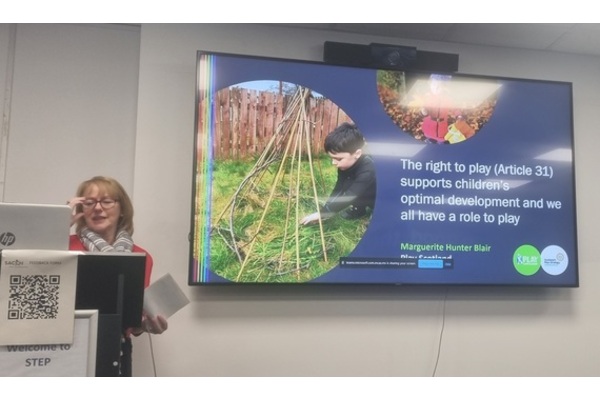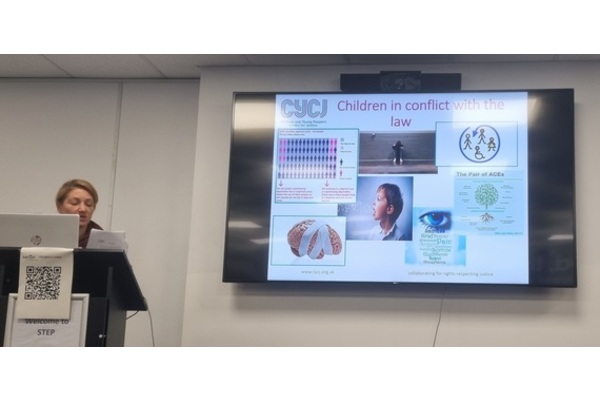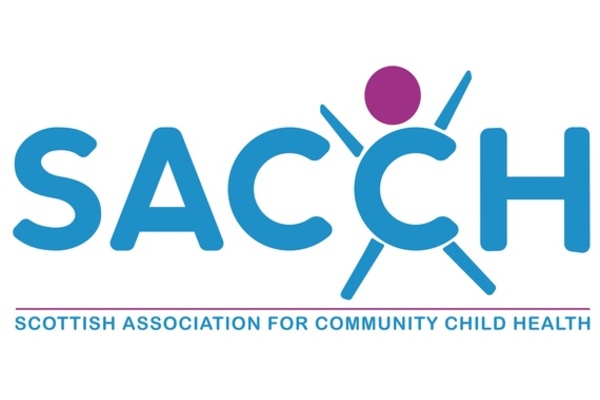
Marguerite Hunter Blair, CEO of Play Scotland

Karen Suszek, Children and Young People's Centre for Justice
As Scotland prepares to become the first devolved nation to incorporate the United Nations Convention on the Rights of the Child into domestic law, it felt an opportune time for us to revisit how we apply a rights-based approach to our practice as community paediatricians and allied health professionals caring for children and young people. Children are recognised as a vulnerable group in need of protection. Their rights, which are universal, indivisible, interdependent and interrelated, provide the basis on which we all practice and give us a helpful framework on which to base our clinical services and ensure that we provide the best care possible.
Dr Shiuli Russell, outgoing Chair of SACCH, introduced the hybrid in-person/virtual conference and welcomed delegates to a charmingly autumnal Stirling. We then heard from Anne Wilson of Children's Health Scotland who set the scene for the day: reminding us of how the UN Convention on the Rights of the Child is at the heart of everything we do as child health professionals. After a recap of which UNCRC articles are particularly relevant to us (23: children with disability & 24: health and health services – though all are important for healthy child development!), Anne took us through the European Association for Children in Hospital (EACH) Charter. The Charter lays out the rights of children and their families before, during and after a stay in hospital and when they are in contact with health services more broadly.(1) There is a free e-learning course for those keen to learn more about the 10 points stipulated in the charter. With delegates’ commitment to provide child-centred and rights-based healthcare to our patients re-affirmed, we were ready for the rest of the day.
Karen Suszek from Children and Young Peoples Centre for Justice then presented on children in conflict with the law. This was a moving session which highlighted the risks to children’s rights when they are in conflict with the law. These children are particularly vulnerable; 59% have experienced four or more adverse childhood experiences and a significant proportion have a neurodevelopmental disorder which are often undiagnosed.(2) The Children and Young Peoples Centre for Justice encourage rights-based rehabilitative care for children who have experienced of the criminal justice process. There followed an interesting discussion regarding what we as healthcare professionals can do for children in conflict with the law.
Marguerite Hunter Blair, CEO of Play Scotland, gave an uplifting talk on the importance of supporting children’s right to play. An image of the Spice Girls popped up on screen to serve as a handy reminder of the diverse skills and personal qualities that play can help to nurture: social, physical, intellectual, creative and emotional. Marguerite reflected on children’s gradual reduction in occupation of public spaces over the generations, the need for ‘free range’ play (after all, if chickens can range freely, why can’t children?) and how we must consider how we design spaces and places for all children, inclusive of those with disabilities.
Speech and Language therapists, Karen Marshall and Annie Welsh, from NHS Lothian gave us a fantastic interactive introduction to Signalong (a similar signing language to Makaton). The audience clearly enjoyed the session and were immediately keen to show off their new skills!
Sarah Robertson, Lorna Caddick, Eva Drummond and Ava Marshall from Generation Scotland then presented on the power of positive participation: involving children and young people in research. It was particularly inspiring to hear Eva (16) and Ava (14), both part of the Youth Panel Advisory Group on a study about loneliness, speak about the benefits they have experienced from their involvement. Sarah highlighted some brilliant examples of how engaging young people in research design and recruitment has greatly helped their research to connect with children and young people e.g. by providing invaluable knowledge of TikTok trends, Instagram hashtags and youth-friendly re-wording of study materials.
The SACCH AGM followed and a warm welcome was given to Dr Alison McLuckie, incoming Chair of SACCH along with several other new committee members. After a refreshing (and delicious!) lunch break spent browsing an array of thought-provoking posters, we were straight back into it with four abstract presentations which delivered plenty further food for thought.
Dr Seremma Parsons, FY2, presented her audit on the use of chaperones in child protection medical examinations (CPME). A significant number of CPMEs were not chaperoned, leaving both the examiner and patient at risk. RCPCH guidance states that all CPMEs require a trained chaperone.(3) Dr Andrew Tester, an ST5 trainee in West of Scotland, presented his audit of thyroid surveillance in children with Down Syndrome. His findings showed that a high proportion of thyroid function tests were missed or performed late when compared to the DSMIG guidelines. It was great to hear of the subsequent positive steps that have been taken to address this. Dr Fran Wardle, an ST4 trainee in West of Scotland, presented a review of physical injury in children with disability. Her findings showed that children with autism were over-represented in child protection medical assessments (4.2%, compared to 1.76% prevalence in general child population). This sparked some useful discussion about pathways to CPME and if we can do more to help prepare children with neurodiversity for assessments. Jennifer Veitch, a medical student from the University of Edinburgh, presented her review of non-urgent presentations to the emergency department. Her review highlighted that many of these presentations were referrals from primary care. This encouraged us to consider how we can work collaboratively with our colleagues in the community and primary care to ensure that children can access their right to healthcare in the appropriate setting.
Anne Wilson and Michelle Wilson then led small group workshops in which delegates were asked to consider a 12-year-old child who required an MRI but did not want an anaesthetic. Using the EACH charter as a framework, groups were asked to consider how to respect and uphold the rights of the child in this situation. This really brought home some key lessons of the day: to respect each child as an individual, listen to their needs and wishes, and address these in a way that supports their right to access the best possible healthcare.
With energy revitalised, we headed into the final sessions of the day. Jennifer Morrison and Lauren Craig from the SCIM Team presented on the Scottish Child Interview Model used in joint investigative interviews (JII) by police and social workers. This important development promotes child focused process, strives to minimise the risk of further traumatisation and upholds the right for every child to be safe and to be heard. Then we had an update from Dr Lynda Fenton, a Public Health consultant with Public Health Scotland, on the development of a New Child Health System, the aim of which is to provide an improved national data system which includes a disability and support needs module. Dr Fenton stressed the importance of gathering the right data to understand the needs of children with disabilities in the hope that we can use this to reduce inequalities.
To round off the day Dr Russell awarded prizes to Dr Fran Wardle for best abstract presentation and Dr David Hayburn who received the William Morris prize for the best poster at the Scottish Paediatric Society 2022. Themes emerged throughout the day of the need for good quality data collection to inform policies and practice, the importance of respecting children’s rights throughout child protection and justice processes and the role of clinicians in advocating for the best possible healthcare services for our patients.
The conference certainly gave delegates plenty of food for thought, digested with chatter and laughter throughout the day. Thank you to all the speakers and delegates for creating such an enriching and stimulating conference. We look forward to next years’ conference!
Dr Maya Kohli-Lynch, Dr Alasdair Campbell, Dr Alison McLuckie




